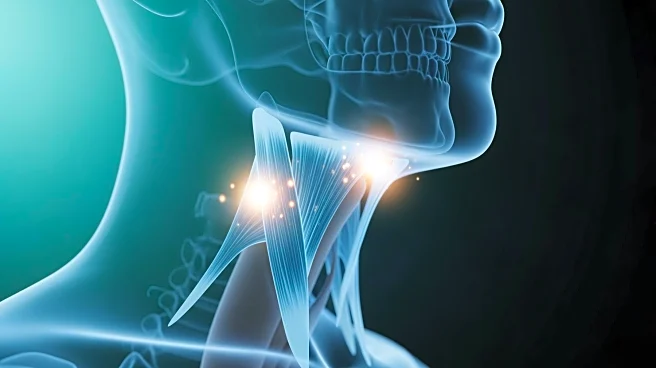What's Happening?
A mother, Gretchen Scherer, discovered her son Gavin's inability to burp, a condition known as retrograde cricopharyngeus dysfunction (R-CPD). This condition, informally called no-burp syndrome, was identified
in 2019 and is characterized by the cricopharyngeus muscle remaining tense, preventing burping. Gavin's symptoms included severe bloating and flatulence, which worsened over time. After researching, Scherer found a clinic offering an experimental Botox treatment to relax the muscle, allowing retraining. Despite insurance challenges, Gavin underwent the procedure successfully, significantly improving his quality of life.
Why It's Important?
R-CPD, though rare, can severely impact individuals' lives, causing discomfort and social anxiety. The discovery and treatment of Gavin's condition highlight the importance of parental vigilance and advocacy in healthcare. It underscores the need for awareness among medical professionals about emerging conditions like R-CPD. The successful treatment using Botox, despite insurance hurdles, demonstrates the potential for innovative medical solutions to improve patient outcomes. This case may encourage further research and acceptance of such treatments, potentially benefiting others with similar conditions.
What's Next?
Following Gavin's successful treatment, there may be increased interest in the Botox procedure for R-CPD. As awareness grows, more individuals might seek diagnosis and treatment, prompting healthcare providers to familiarize themselves with the condition. Insurance companies may face pressure to reconsider coverage policies for experimental treatments. Additionally, Gavin's story could inspire further research into R-CPD, potentially leading to new therapies or FDA approval for Botox use in this context.
Beyond the Headlines
Gavin's journey highlights broader issues in healthcare, such as the challenges of diagnosing rare conditions and navigating insurance systems. It raises ethical questions about access to experimental treatments and the role of parental advocacy in securing necessary care. The story also reflects cultural aspects of healthcare, where non-traditional symptoms can be overlooked, emphasizing the need for comprehensive medical education and patient-centered approaches.









